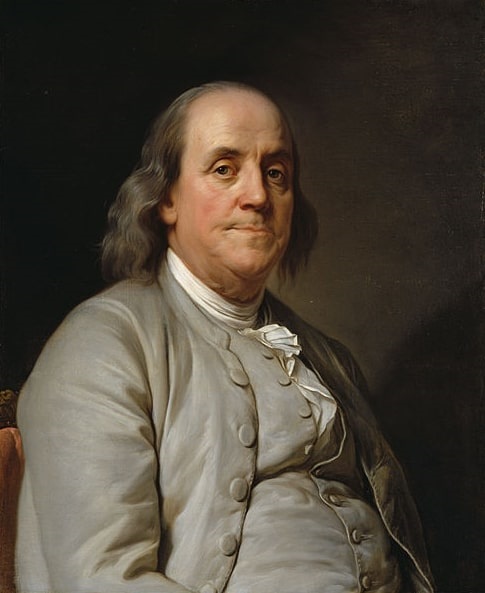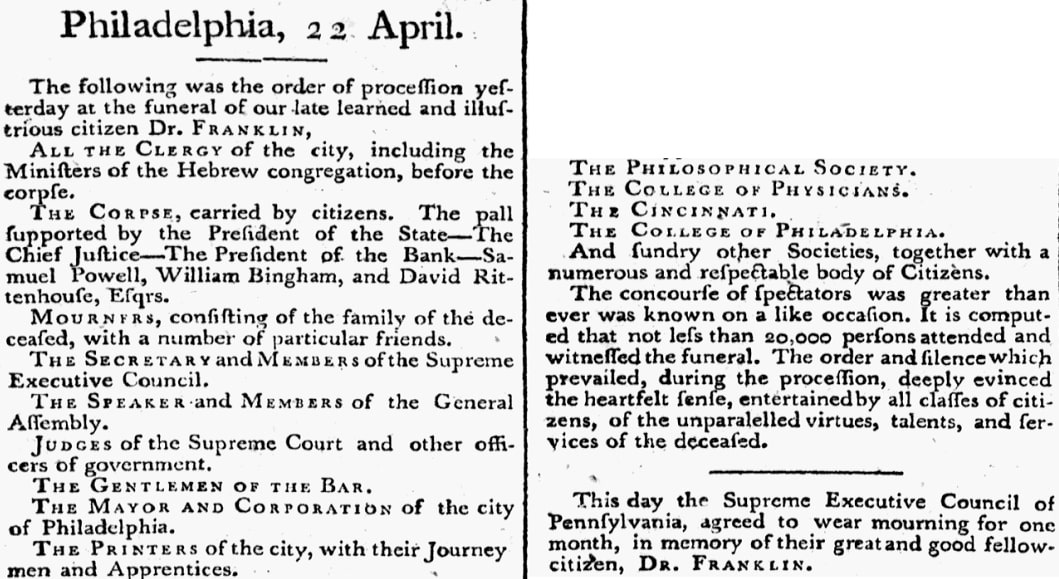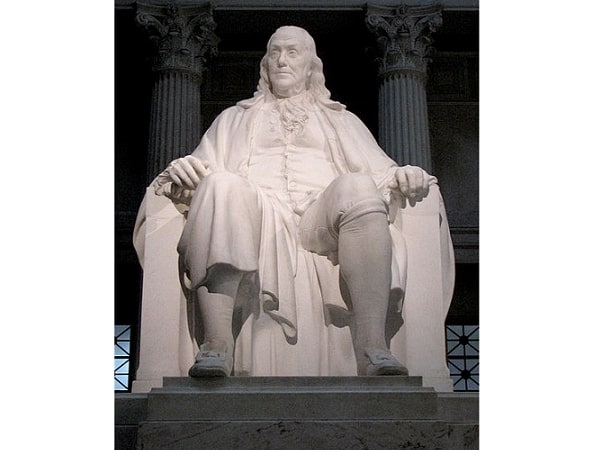Introduction: In this article, Jane Hampton Cook writes about the funeral of Benjamin Franklin and shows how much he was loved and respected. Jane is a presidential historian and author of ten books, including Stories of Faith and Courage from the Revolutionary War. Her works can be found at Janecook.com. She is also the host of Red, White, Blue and You.
Old newspaper articles, especially obituaries, are one of the best tools for genealogy research. Obituaries also tell us a lot about historic figures that we are very familiar with. For example, the newspaper coverage of early America’s most famous newspaper man, Benjamin Franklin, shows how much he was beloved in his own time.

Benjamin Franklin’s funeral was held 231 years ago on 21 April 1790, after his death on April 17 at the age of 84. The funeral was the largest of its kind ever seen in Philadelphia.
Philadelphia’s Federal Gazette reported:
“The concourse of spectators was greater than ever was known on a like occasion. It is computed that not less than 20,000 persons attended and witnessed the funeral. The order and silence which prevailed, during the procession, deeply evinced the heartfelt sense, entertained by all classes of citizens, of the unparalleled virtues, talents, and services of the deceased.”

This number is remarkable when compared to the city’s population of 28,000. More than 70% of Philadelphia attended Franklin’s funeral!
The pallbearers were the president of the state, the chief justice of Pennsylvania, and other leaders.
This article also reported:
“All the clergy of the city, including the ministers of the Hebrew congregation, (walked) before the corpse.”
In addition to family and friends, the procession included members of the Pennsylvania General Assembly, the Pennsylvania Supreme Court, the mayor of Philadelphia, city leaders, newspaper printers and their journeymen, along with members of different societies including the Society of Cincinnatus and the Philosophical Society.
Newspaper readers also learned in great detail about Franklin’s last days. His physician released a statement noting that Franklin had been confined in bed for nearly a year because of gallstones. Though dealing with bouts of pain, his mental faculties remained intact and he worked as much as he could.
The Federal Gazette published the doctor’s statement, including this description of how Franklin conducted himself, in between bouts of pain:
“Still, in the intervals of pain, he not only amused himself with reading and conversing cheerfully with his family and a few friends, who visited him, but was often employed in doing business of a public as well as private nature, with various persons, who waited on him for that purpose; and in every instance displayed, not only that readiness and disposition of doing good, which was the distinguishing characteristic of his life, but the fullest and clearest possession of his uncommon mental abilities.”
In his last days Franklin, according to his physician:
“Acknowledged his grateful sense of the many blessings he had received from that Supreme Being, who had raised him, from small and low beginnings, to such high rank and consideration among men.”
When members of Congress in New York learned of Franklin’s death, Virginia Congressman James Madison rose on the floor of the House of Representatives and praised Franklin’s “native genius” and his contributions to human nature, science, freedom and his country. Madison proposed that “members wear the customary badge of mourning for one month.”
As word of Franklin’s death spread, tributes began to pour in. Poets penned verses that told of his accomplishments. “O electricity! From thee he draws a large, a glorious portion of applause,” a poet proclaimed in the Federal Gazette, while noting that Franklin was known for his witty and wise sayings. He was also known for his diplomacy in France on behalf of America. “Record his name in thy historic page, There let the statesman triumph with the sage.”
But perhaps the most intimate newspaper article was an old letter Franklin had written to comfort a family member after the death of his brother, John Franklin, in 1756. Published by the Pennsylvania Mercury on 22 April 1790, the letter revealed Franklin’s philosophy on living and dying.
“We are spirits. That bodies should be lent us, while they can afford us pleasure, assist us in acquiring knowledge, or doing good to our fellow creatures, is a kind and benevolent act of God – when they become unfit for these purposes, and afford us pain instead of pleasure – instead of an aid, become an incumbrance, and answer none of the intentions for which they were given, it is equally kind and benevolent that a way is provided by which we may get rid of them. Death is that way.”
Franklin concluded his letter with this:
“Our friend [Franklin’s deceased brother] and we are invited abroad on a party of pleasure – that is to last forever – His chair was first ready, and he is gone before us – we could not all conveniently start together, and why should you and I be grieved at this, since we are soon to follow, and we know where to find [him].”
Franklin’s last act of doing good to his fellow creatures was his last message to Congress, which was a February 1790 petition calling for the abolishment of slavery and the end of the slave trade. He wanted Congress to “devise means for removing the inconsistency from the character of the American people.”
Today, when tourists visit Franklin’s Philadelphia grave, they behold a bricked wall with two plaques. On one is the epithet that Franklin wrote for himself, one fitting for his role as a newspaper publisher.
“The Body of B. Franklin, Printer;
Like the cover of an old book,
Its contents torn out,
And stript of its lettering and gilding,
Lies here, food for worms.
But the work shall not be wholly lost:
For it will, as he believ’d, appear once more,
In a new and more perfect edition,
Corrected and amended by the Author.”
Note: Just as an online collection of newspapers, such as GenealogyBank’s Historical Newspaper Archives, helped tell the story of Benjamin Franklin’s life and death, they can tell you stories about your ancestors that can’t be found anywhere else. Come look today and see what you can discover!
Explore over 330 years of newspapers and historical records in GenealogyBank. Discover your family story! Start a 7-Day Free Trial
